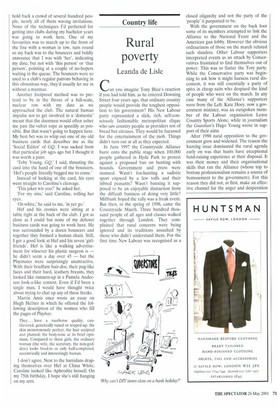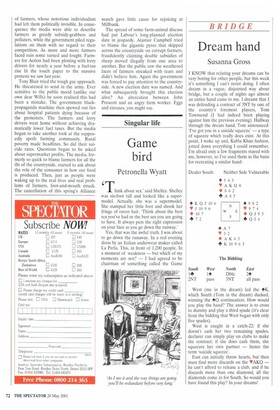Country life
Rural poverty
Leanda de Lisle
Can you imagine Tony Blair's reaction if you had told him, as he entered Downing Street four years ago, that ordinary country people would provide the toughest opposition to his government? His New Labour party represented a slick, rich, self-consciously fashionable metropolitan clique who saw country people as providers not of bread but circuses. They would be harassed for the entertainment of the mob. Things didn't turn out at all as they expected.
In June 1997 the Countryside Alliance burst onto the public stage when 100,000 people gathered in Hyde Park to protest against a proposed ban on hunting with hounds. Government and press were stunned. Wasn't fox-hunting a sadistic sport enjoyed by a few toffs and their inbred peasants? Wasn't banning it supposed to be an enjoyable distraction from the difficult business of doing very little? Millbank hoped the rally was a freak event. But then, in the spring of 1998, came the Countryside March. Three hundred thousand people of all ages and classes walked together through London. They complained that rural concerns were being ignored and its traditions assaulted by those who didn't understand them. For the first time New Labour was recognised as a closed oligarchy and not the party of the 'people' it purported to be.
With the government on the back foot some of its members attempted to link the Alliance to the National Front and the American gun lobby. However the obvious ordinariness of those on the march refuted such slanders. Other Labour supporters interpreted events as an attack by Conservatives frustrated to find themselves out of power. This was to flatter the Tory party. While the Conservative party was beginning to ask how it might harness rural discontent, it was still essentially a party of spivs in cheap suits who despised the kind of people who were on the march. In any case many of the Alliance's supporters were from the Left. Kate Hoey, now a government minister, was an outspoken member of the Labour organisation Leave Country Sports Alone, while in journalism the Guardian's Hugo Young wrote in support of their aims.
After 1998 rural opposition to the government grew and widened. The reason the hunting issue dominated the rural agenda early on was that hunts have exceptional fund-raising experience at their disposal. It was their money and their organisational skills that ran the Alliance (whose top to bottom professionalism remains a source of bemusement to the government). For this reason they did not, at first, make an effective channel for the anger and desperation of farmers, whose notorious individualism had left them politically invisible. In consequence the media were able to describe fanners as greedy subsidy-grabbers and polluters, while the government piled regulations on them with no regard to their competition. As more and more farmers faced ruin some turned and fought. Farmers for Action had been plotting with lorry drivers for nearly a year before a fuel-tax rise lit the touch paper to the massive protests we saw last year.
Tony Blair tried the tough guy approach. He threatened to send in the army. Ever sensitive to the public mood (unlike our own dear Wills) he soon realised this had been a mistake. The government blackpropaganda machine then spewed out lies about hospital patients dying because of the protesters. The farmers and lorry drivers went home without achieving dramatically lower fuel taxes. But the media began to take another look at the supposedly spoilt farming community. Rural poverty made headlines. So did their suicide rates. Questions began to be asked about supermarket profits. The media, formerly so quick to blame farmers for all the ills of the countryside, started to ask about the role of the consumer in how our food is produced. Then, just as people were waking up to the real lives and real problems of farmers, foot-and-mouth struck. The cancellation of this spring's Alliance march gave little cause for rejoicing at Millbank.
The spread of some farm-animal disease had put Labour's long-planned election date in jeopardy. Alastair Campbell tried to blame the gigantic pyres that skipped across the countryside on corrupt farmers, fraudulently claiming double subsidies of sheep moved illegally from one area to another. But the public saw the weathered faces of farmers streaked with tears and didn't believe him. Again the government was forced to pay attention to the countryside. A new election date was named. And what subsequently brought this election alive? An altercation between John Prescott and an angry farm worker. Eggs and circuses, you might say.



















































































 Previous page
Previous page